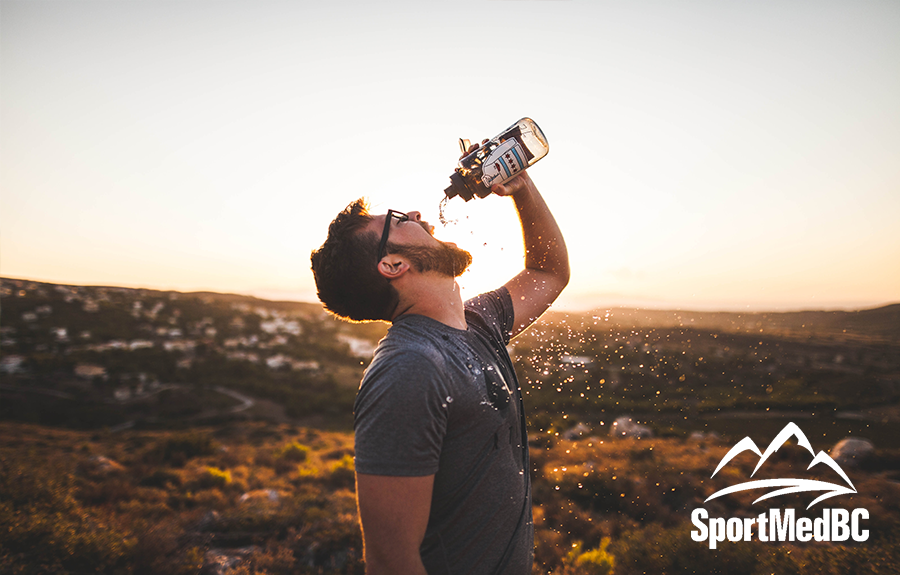Staying properly hydrated during the summer heat
Jul 12, 2017

Stay safe and performing at your best in warm weather conditions with these hydration tips! Whether you’re doing high intensity training or simply enjoying the outdoors on a hike or a run, it is important to stay hydrated, especially when the mercury rises during the summer months.
Water is the basis for life. It is second only to oxygen in importance for health, making up to 75% of the body. Although water does not provide a source of calories, adequate hydration is at least as important to good athletic performance as the food you eat and is essential for efficient training, playing and racing.
Proper hydration not only quenches one’s thirst but allows the body to flush toxins, maintain system equilibrium (balance), support brain function, hormone balance, metabolic processes (including fat metabolism), the transportation of life-giving vitamins and minerals, and supports the integrity of muscle, joint and bone in our bodies.
Although the human body can, in extreme cases, go without food for up to six weeks, it can only survive a week without water. As a general rule, it is recommended that the average person consume at least eight, 8-ounce servings of water each day (2 litres a day). The more time you spend outdoors and the more active you are, the more water you need to replenish lost fluids. Replenishing fluids is especially important when exercising in hot and humid weather conditions as your body tends to sweat more.
Tips for Proper Hydration:
- Start and end your day with a 250 ml serving of water. Your body loses water while you sleep, so drink a serving before bed and again when you wake up.
- Drink before you are thirsty. By the time you feel thirsty; you have probably already lost two or more cups of your total body water composition. Drink plenty of water throughout the day. Carry a bottle of water with you daily. Keep a bottle of water on your desk and refill at the office water cooler regularly.
- Don’t substitute with alcoholic beverages. Alcohol is a diuretic and will cause you to lose water through increased urination.
- It’s important to note that although coffee and tea do have a diuretic effect, they do provide a significant amount of fluid and any effect of caffeine on urine losses are minor (especially for habitual caffeine users).
- Keep drinking water even when it is cold outside. You may not feel thirsty as you do when it’s hot, but you are still going to lose water through perspiration. You also lose fluids through exhaled air. When cold, dry air is inhaled, it is warmed and moistened in the lungs and exhaled as humid warm air. This process makes intense demands on the body’s water supply.
- Average sweat rates can vary from 0.5L/hour to more than 2.5L/hour. Knowing your sweat rate will help you to better prepare for both training and competition. Calculate your sweat rate. Taking the time to calculate how much you sweat is a fundamental consideration for optimal hydration.
Hydration Prior to Exercise
egin all workouts well hydrated. Drink 450-650 ml of water or sports drink 1 to 3 hours before exercise. Consuming an additional 200-300 ml 10-20 minutes prior to the training session is also good practice.
Hydration During Exercise
Drink 200-350 ml every 15-20 minutes. If possible, given your sporting activity, take regular ‘sips’ throughout the activity. For longer training sessions (or in hot weather) consider using a sports drink as part of your hydration regimen (prior to, during and following activity). The sodium and potassium content in most sports drinks will permit you to maintain a proper electrolyte balance.
Hydration Following Activity
Drink 500-1000ml within 1 hour, post exercise. You should aim to ‘push’ fluid intake even if you don’t feel thirsty. Given that you will eliminate some fluid through urination, you’ll want to drink more than what you’ve lost.
How can I tell when I’m dehydrated?
One of the easiest ways to tell whether you are adequately hydrated is by checking the colour of your urine. In general, light coloured urine is an indication of adequate hydration. If you are experiencing infrequent urination and the colour of the urine is dark yellow, these are signs of dehydration.
Other signs of dehydration are: thirst, headache, constipation, fatigue, weakness, dizziness, irritability, cramps, depression, weight, gain, water retention, skin blemishes, vomiting or nausea, and bladder infections.
Can I drink too much?
Absolutely! While many athletes understand the importance of proper hydration, most do not realize that overhydrating can dangerously lower blood sodium levels; a condition known as hyponatremia or “water intoxication.”
Everyone responds to exercise differently. Ultimately, hydration is not simply a question of drinking fluids. It’s about knowing your own body and drinking the right fluids for you and the various activities you participate in, preparing accordingly for various environmental conditions.
